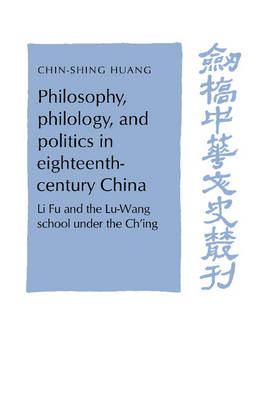
Philosophy, Philology, and Politics in Eighteenth-Century China
Li Fu and the Lu-Wang School under the Ch'ing
Seiten
2003
Cambridge University Press (Verlag)
978-0-521-52946-4 (ISBN)
Cambridge University Press (Verlag)
978-0-521-52946-4 (ISBN)
The author explains the contributions of Li Fu to the Lu-Wang school of Confucianism, and gives a clear, succinct account of the Lu-Wang and Ch'eng-Chu schools from the twelfth century to the eighteenth.
This book explains the general intellectual climate of the early Ch'ing period, and the political and cultural characteristics of the Ch'ing regime at the time. Professor Huang brings to life the book's central characters, Li Fu and the three great emperors - K'ang-hsi, Yung-cheng, and Chien-lung - whom he served. Although the author's main concern is to explain the contributions of Li Fu to the Lu-Wang school of Confucianism, he also gives a clearly written account of the Lu-Wang and Ch'eng-Chu schools from the twelfth century to the eighteenth. In a clear, succinct style, Huang explains the historical differences between the Ch'eng-Chu and Lu-Wang schools without sacrificing the subtleties of either. The book culminates in a discussion of the hero-emperor K'ang-hsi's appropriation of the 'Tradition of the Way' from his intellectual officials, which denied them their traditional role as moral censors and critics of the emperor's exercise of authority.
This book explains the general intellectual climate of the early Ch'ing period, and the political and cultural characteristics of the Ch'ing regime at the time. Professor Huang brings to life the book's central characters, Li Fu and the three great emperors - K'ang-hsi, Yung-cheng, and Chien-lung - whom he served. Although the author's main concern is to explain the contributions of Li Fu to the Lu-Wang school of Confucianism, he also gives a clearly written account of the Lu-Wang and Ch'eng-Chu schools from the twelfth century to the eighteenth. In a clear, succinct style, Huang explains the historical differences between the Ch'eng-Chu and Lu-Wang schools without sacrificing the subtleties of either. The book culminates in a discussion of the hero-emperor K'ang-hsi's appropriation of the 'Tradition of the Way' from his intellectual officials, which denied them their traditional role as moral censors and critics of the emperor's exercise of authority.
Introduction; 1. The original argument (1): 'Chu Hsi versus Lu Hsiang-shan' (Chu-Lu i T'ung): a philosophical interpretation; 2. The original argument (2): Wang Yang-ming and the problematic of 'Chu Hsi versus Lu Hsiang-shan'; 3. The critical dimension in the Confucian mode of thinking: the conception of the Way as the basis for criticism of the political establishment; 4. Li Fu: an example of the Lu-Wang scholar in the Ch'ing (1): his life; 5. Li Fu: an example of the Lu-Wang scholar in the Ch'ing (2): his thought; 6. Li Fu and the philological turn; 7. The price of having a sage-emperor: the assimilation of the Tradition of the Way by the political establishment in the light of Emperor K'ang-hsi's governance.
| Erscheint lt. Verlag | 18.12.2003 |
|---|---|
| Reihe/Serie | Cambridge Studies in Chinese History, Literature and Institutions |
| Zusatzinfo | Worked examples or Exercises |
| Verlagsort | Cambridge |
| Sprache | englisch |
| Maße | 153 x 229 mm |
| Gewicht | 360 g |
| Themenwelt | Geschichte ► Allgemeine Geschichte ► Neuzeit (bis 1918) |
| Geisteswissenschaften ► Geschichte ► Regional- / Ländergeschichte | |
| Geisteswissenschaften ► Philosophie ► Östliche Philosophie | |
| ISBN-10 | 0-521-52946-8 / 0521529468 |
| ISBN-13 | 978-0-521-52946-4 / 9780521529464 |
| Zustand | Neuware |
| Haben Sie eine Frage zum Produkt? |
Mehr entdecken
aus dem Bereich
aus dem Bereich
Europa 1848/49 und der Kampf für eine neue Welt
Buch | Hardcover (2023)
DVA (Verlag)
48,00 €
Giordano Bruno - ein ketzerisches Leben
Buch | Hardcover (2024)
C.H.Beck (Verlag)
29,90 €


